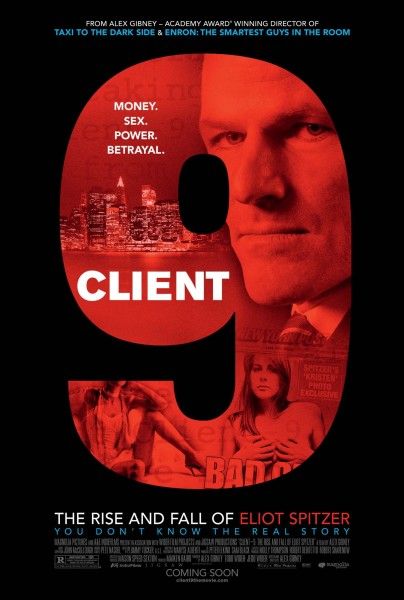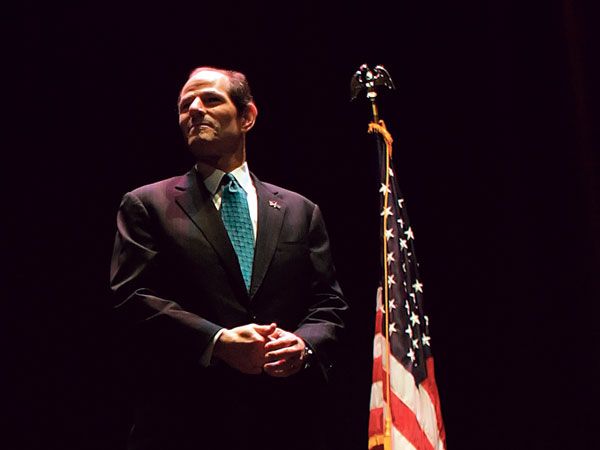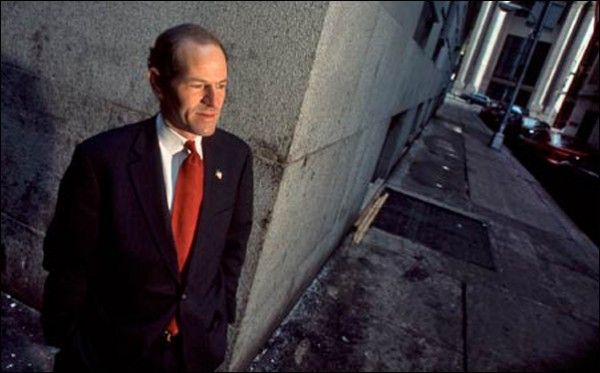We all watched while Elliot Spitzer became a darling of the Democratic party in his role as New York's Attorney General, then as the state's Governor, and then as the latest politician to pull an Icarus and fall from grace. Like many before him, Spitzer ran afoul of a sex scandal while in office, and it's a story that we've all heard a million times before. Alex Gibney's Client 9 tells Spitzer's story, but is it just another politician-as-Icarus fall-from-grace story? Or is there more to the Elliot Spitzer case than might have initially met the eye? My review of Client 9 after the jump.
When I stuck Client 9 into my Blu-ray player, I was relatively sure that I was about to see a two-hour version of a story that I'd already heard: politician gets popular overnight, politician earns himself some pretty threatening enemies while in office, politician finally pisses off enough of the wrong people and ends up with a magnifying glass hanging over his head, only to reveal that the "white knight" isn't nearly as dirt-free as everyone had thought. This, of course, would lead to the inevitable "fall from grace", and the end credits would roll while I, the audience, contemplated greed and lust and power and ambition.
In other words, I was kind of yawning when I stuck Client 9 into my Blu-ray player. I didn't need another version of this story, and I didn't care enough about Elliot Spitzer one way or another to sit through yet another telling of this tale. But almost immediately, Alex Gibney's film piqued my curiosity, and by the time it wrapped, I was wondering why the hell Client 9 didn't end up on the Academy's list of "Best Documentaries" this year: Client 9 is that good. In fact, it'd be fair to call it one of the best movies I didn't get around to seeing last year.
Thank God, then, for home video. I suspect that many of you may have avoided Client 9 when it was playing at your local arthouse because you figured it the way I did: just another version of an oft-played song. But Gibney's version of events--and that's certainly what this film is; surely some of the people that appear here would bristle at their depiction in the film, to say nothing of their opinion regarding the film's authenticity--is cleverly-edited, compulsively watchable, never boring (even when it's delving into the nitty-gritty of Wall Street fraud and political shenanigans), and has much more to say than I expected it to.
The film begins as Spitzer takes over as New York's Attorney General. The guy's an all-star, going after all the big players that no one else ever had the stones to. He takes on the banks, he takes on Wall Street, he even finds time to assist the FBI in bringing down a high-class prostitution ring in New York City. The dude's on fire, and it appears that he's getting results: with each new case, the people of NYC only seem to welcome his passionate (some would say "infuriated") manner and no-holds-barred approach to keeping big-business in check. To put it in terms that film geeks with a total lack of political interest will understand, Elliot Spitzer was to New York City what Harvey Dent is to Gotham in The Dark Knight...except moreso.
Of course, that kind of ass-kicking is bound to get one noticed, especially by those who are having their asses so summarily kicked. While on the warpath, Spitzer manages to place himself on the shit-list of some very powerful New Yorkers, and-- with the benefit of hindsight-- we watch as Spitzer's popularity with the people increases in direct opposition to his popularity amongst those making a killing on Wall Street. No one ever comes out and says that Spitzer was pissing off the kind of people that might have had, say, a bomb planted in his car, but you get the impression that if something like that happened, no one would've been much surprised: Spitzer's a lightning rod.
He also happens to be a Democrat, and Gibney's film puts forth a theory about the way that Spitzer's career imploded without ever spelling it out for us. If you watch the film and process the information that you're given, you'll be hard-pressed not to suspect that the Republican party had something to do with his bust. It's not up for debate that Spitzer picked up the phone, made those appointments, slept with those hookers, and cheated his family-- there's no doubt that this occurred. But that's not where the story ends: we learn that similar cases-- in NYC and D.C.-- were treated completely differently than Spitzer's. "Johns" are almost never attacked by prosecutors during big-ass prostitution stings: generally, it's the "Madame" that gets busted, and sometimes someone's name will get dragged through the mud while that's happening. But Spitzer? His case doesn't pan out that way, and it's clear-- from the information presented in Gibney's film-- that Republican opposition played a large role in the way that Spitzer's involvement with those hookers was handled.
Spitzer appears, as do many of his biggest enemies. Ashley Dupree-- the high-priced call girl (now New York Post columnist) who was portrayed as Spitzer's go-to girl-on-the-side-- appears as well, but only in archived interviews. As it turns out, Dupree wasn't the girl that Spitzer visited with (ahem) the most: there's another girl, one who met with Spitzer on several occasions (one of the film's many revelations is that Dupree only met with Spitzer once), and Gibney has to work around the fact that this call girl will tell him whatever he wants to know...but won't allow her voice, face, or name to appear on camera. Gibney's solution to this speedbump is clever, but I won't spoil it here. Suffice it to say that this hooker has some very interesting things to say...even if someone else is saying it.
The story of the hookers that Spitzer engages runs parallel to the story of Spitzer's rise to power, and eventually the two collide. From there on out, the film gets into the tactics that were used against Spitzer in the press and in Washington, and it's all fascinating stuff. Many of the topics that Client 9 touches on are-- to this humble critic-- more boring than watching paint dry, but Gibney's film manages to make every mention of mutual funds and high-interest loans and public forums as compelling as the scenes featuring skanky confessions from "women of ill-repute". Really, it's compelling stuff, and it'll very likely change your entire opinion of Elliot Spitzer in general.
That said, it probably won't convince you that Elliot Spitzer's a great dude. But the fact that Spitzer is so willing to confront his own shortcomings and own up to the mistakes he made does make him a little more endearing than you might expect, and I found myself curious about what Spitzer's going to do with his absolutely-destroyed career now. He's got that talk show, but will he ever attempt another run at public office? This film will leave you wondering.
The Blu-ray comes packed with a bunch of bonus features, including a director's commentary (and a lengthy sit-down chat with Gibney) in addition to deleted scenes, a making-of, and several extended interviews with some of the major players in this saga. All of it is worth watching, and I can virtually guarantee that you'll be clicking through all the features once the film wraps, if only to learn a few more precious details about the people you've just spent the last two hours with. Between this, Restrepo, and Exit Through The Gift Shop, 2010 was a great year for the documentary. We can only hope that one documentary released in 2011 will be as entertaining, thought-provoking, and thrilling as Alex Gibney's Client 9.




